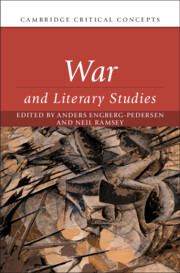Book contents
- War and Literary Studies
- Cambridge Critical Concepts
- War and Literary Studies
- Copyright page
- Contents
- Figures
- Contributors
- Acknowledgments
- Introduction: War, Literature, and the History of Knowledge
- Part I Origins and Theories
- Part II Foundational Concepts
- Part III Emerging Concepts
- Chapter 16 War and Drones
- Chapter 17 War and Humanitarianism
- Chapter 18 War and Capitalism
- Chapter 19 War and Revolution
- Chapter 20 War and Biopolitics
- Chapter 21 War and Nuclear Criticism
- Chapter 22 War and the Personality of Power
- Index
Chapter 19 - War and Revolution
from Part III - Emerging Concepts
Published online by Cambridge University Press: 15 January 2023
- War and Literary Studies
- Cambridge Critical Concepts
- War and Literary Studies
- Copyright page
- Contents
- Figures
- Contributors
- Acknowledgments
- Introduction: War, Literature, and the History of Knowledge
- Part I Origins and Theories
- Part II Foundational Concepts
- Part III Emerging Concepts
- Chapter 16 War and Drones
- Chapter 17 War and Humanitarianism
- Chapter 18 War and Capitalism
- Chapter 19 War and Revolution
- Chapter 20 War and Biopolitics
- Chapter 21 War and Nuclear Criticism
- Chapter 22 War and the Personality of Power
- Index
Summary
As literary scholars have become increasingly concerned with the cultural significance of warfare, the concept of revolution has lost much of the authority it has traditionally enjoyed in discussions of aesthetics and politics. This chapter argues that literary studies have much to learn from the accounts of language and violence found in both military and revolutionary discourses. The first part of the chapter focuses on the maverick status of the word “revolution” in post-Enlightenment thought and describes the emergence of a theory of revolutionary language in Marx and his inheritors. The second part concentrates on Clausewitz’s understanding of state violence, asking why his conception of war should prove so attractive to revolutionaries. The final section of the chapter considers whether the attention paid to war and revolution has led to the neglect of a potentially more fundamental form of conflict: civil war. In closing, it is suggested that as nation-states lose their monopoly on large-scale organized violence, literary and cultural studies will have to embrace new paradigms of transnational and subnational strife.
- Type
- Chapter
- Information
- War and Literary Studies , pp. 307 - 320Publisher: Cambridge University PressPrint publication year: 2023

